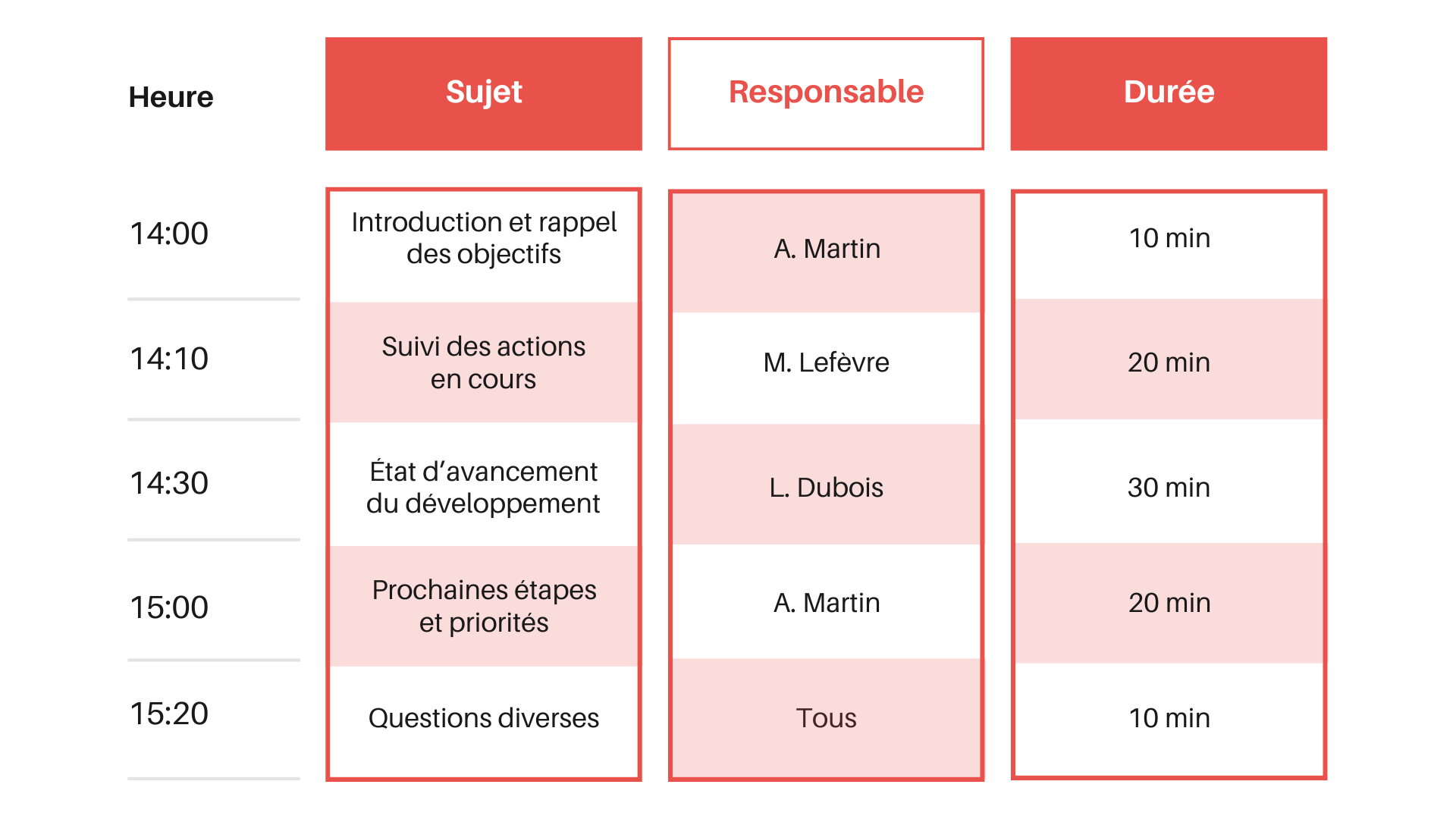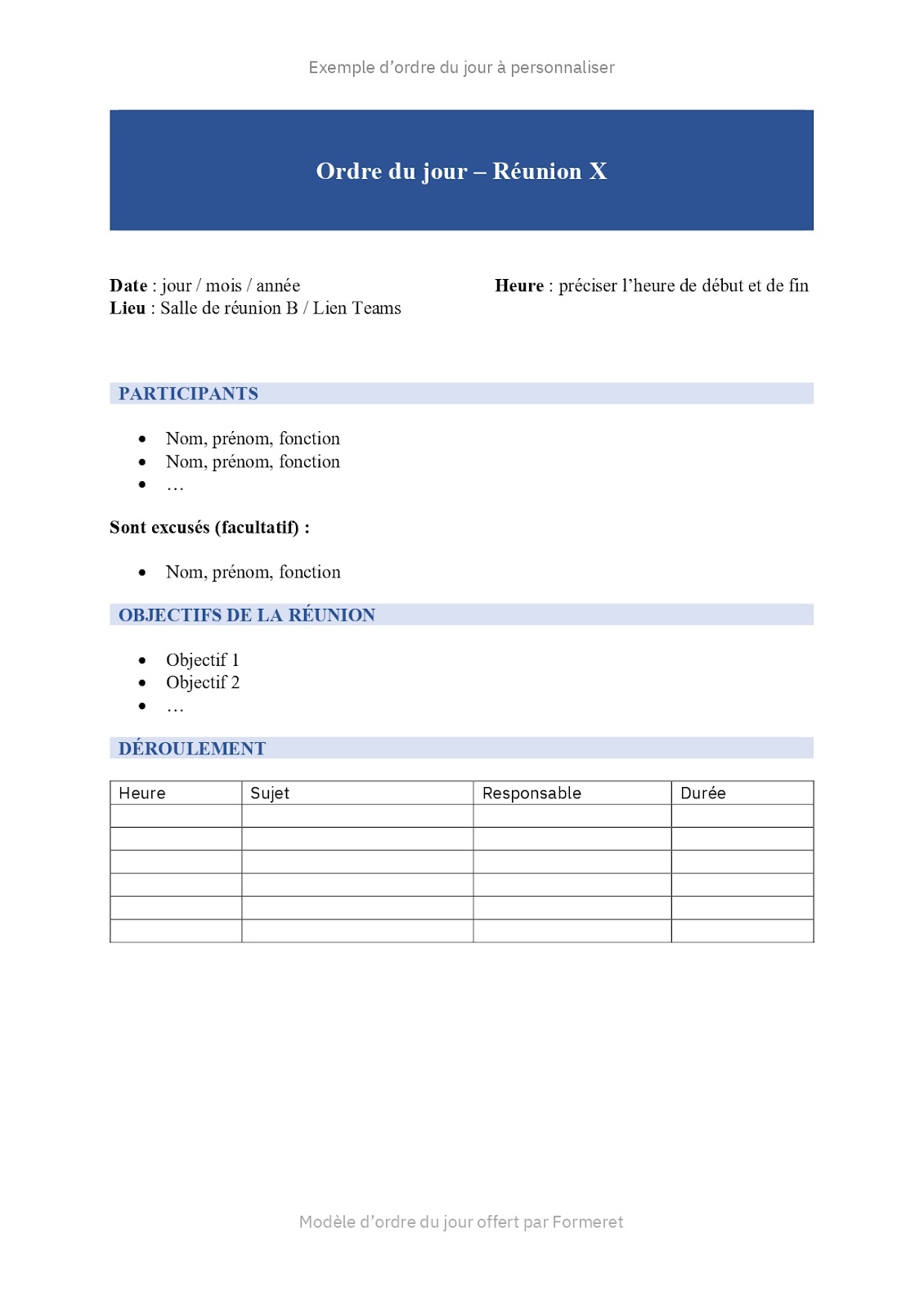Meeting agenda template: practical guide to writing and sample document for download

Too many meetings still start with no clear direction and end without concrete decisions being made. Why? Largely due to the lack of a structured agenda. The latter is however essential: it helps to frame the exchanges, by defining the objective of the meeting, and allows each participant to come well prepared for this meeting.
Whatever the type of encounter, organize a meeting therefore involves drawing up an effective agenda. In this article, we discuss its importance, explain how to write it, and provide you with a ready-to-use template to download.
Why is the agenda essential?
A clear agenda is the key to any productive meeting. Without this document, discussions may become scattered, decisions may be delayed, and the meeting may be perceived as a waste of time by your team members.
Enlightening figures : according to a study by the Yougov Institute, 86% of French people are still confronted with useless meetings and 73% of those questioned would like their meetings to be better organized.
A good agenda allows you to:
- Boost the efficiency of your meetings, in particular by setting clear goals, expectations, priorities and defining the framework for a meeting;
- Tackle all the essentials : it helps to reframe the exchanges during this meeting and to avoid digressions;
- Involve all participants : sending the agenda in advance allows participants to arrive prepared, maximizes their commitment and thus promotes good group dynamics;
- Respect the time limit : the agenda also makes it possible to properly distribute speaking and to allocate a maximum of time to all the topics discussed;
- Facilitate the achievement of goals : set goals are naturally easier to achieve when everyone arrives prepared. The agenda thus increases the efficiency of meetings by allowing everyone to access the necessary documents and to think about topics before the meeting.
- Simplify meeting follow-up : the agenda may become a reference document at the next meeting. Consider taking notes during discussions to keep track of decisions made and actions that need to be taken.
Another significant point: taking the time to write an agenda also allows you to realize whether holding a work meeting is really necessary, quite simply. If all the points entered can be processed asynchronously, then save time for all participants and write an email instead.
Of course, some topics still need to be discussed in real time. If it is necessary to schedule a meeting to effectively advance your projects, do not hesitate and rely on your agenda to boost the productivity of the meeting.

The essential elements of an effective meeting agenda
A good agenda should be synthetic but structured. Here are the essential elements to include (which may vary slightly depending on the type of meeting):
General information
- Professional meeting title
- Date, time, location or videoconference link (depending on whether the meeting is being held in person or remotely)
- List and number of participants
- Duration of the meeting
Objectives of the meeting
- What are we looking for at the end of the meeting? (e.g.: validate a budget, plan an event, solve a problem).
Agenda item
- Topics to be addressed ranked by priority: do not hesitate to highlight the points that require immediate decisions to be taken
- Responsible for each point
- Expected duration for each subject: plan realistic time slots for each point and keep a certain margin of flexibility for unforeseen events or questions.
Other questions (optional)
- Time allotted at the end of the meeting to go around the table in order to gather comments or to discuss additional topics
Next steps
- Conclusion of the meeting, summary of the actions decided, sending of the minutes, date of the next meeting
Quick checklist of items to include
General information
- Date/time/timing
- Location and/or video link
- Attendees
Clear goals
- Purpose of the meeting
Outline of the agenda
- List of topics to be addressed: key points, questions,
- Responsible (s)
- Maximum speaking time for each item
Sample agenda
Here's a simplified effective meeting agenda template. You can adapt it according to the context of your meeting:
Agenda — Project X follow-up meeting
Date : Tuesday 15 July 2025
Hour : 14:00 - 15:30
Location : B meeting room/Teams link
Attendees : A. Martin, L. Dubois, M. Lefèvre, etc.
Objective : Validate the progress of the deliverables and define the priorities for the next phase.


👉 Agenda template to download (PDF)
A few more tips to organize your meeting well

Here are some additional best practices in preparing for a business meeting (e.g. technical meetings, sales meetings, operational meetings, project management meetings, management meetings...).
In addition to writing an effective agenda, applying these tips will help you turn your meeting into a productive, motivating, and unifying encounter.
Share the agenda as soon as possible
The ideal is to send the agenda several days in advance to allow enough time for each participant to gather the necessary information. Alerting your team members in advance allows them to start the meeting with more serenity and concentration. If necessary, they can even share with you some questions or missing points before the big day. This will give you time to send an update if needed.
Send all required documents for the meeting
Preparing a work meeting involves sharing relevant documents with the participants, for example: presentation material, minutes of meetings precedents, additional information, etc. So everyone will be on the same page during the meeting.
Appoint a facilitator for the meeting or for each agenda item
Facilitating the meeting is one of the keys to success. To avoid catching anyone off guard, try to name the person who will be in charge of Facilitate the meeting effectively.
A number of tools and animation techniques can be used to ensure the attention and engagement of all participants (e.g.: icebreaker, use of various media, mind mapping, interactive whiteboards...).
Whichever is most relevant, you can designate one person for the entire meeting (making sure you change the moderator regularly), or assign each agenda item to different people, according to their responsibilities.
Allocate enough time for each topic to be addressed
Try to best assess the time needed to discuss all the key items on the agenda so as not to exceed the expected length of time. Do not hesitate to allow a few extra minutes for questions or unexpected events.
Use animation tools to boost productivity
Les meeting facilitation tools help to:
- maintaining a good dynamic,
- structure exchanges,
- stimulate creativity,
- boost engagement,
- promote collaboration
- ensure effective post-meeting follow-up.
For example, if this is the very first meeting to launch a project, feel free to use a Icebreaker at the start of the meeting. This method is very effective in creating a friendly climate and promoting free exchanges, especially when some employees do not know each other.
Rent a professional meeting room
In some cases, especially for strategic or creative meetings, it may be necessary to rent a boardroom outside the walls of the company. Changing the setting and meeting in a room designed to boost concentration is an additional lever for productivity and guarantees a smooth meeting.
Are you looking for a suitable place to organize your meetings? Discover our modular rooms in the heart of Paris and offer your teams an ideal setting, in perfectly equipped spaces guaranteeing the confidentiality of exchanges.
Specialists in the rental of professional meeting rooms in Paris, the Formeret teams put their expertise at the service of your professional events: reception, quality audiovisual equipment, comfort of participants, catering, relaxation areas... Contact us and take advantage of our preferential rates.